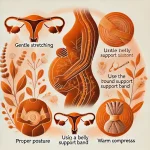Zwangerschap is een bijzondere periode vol spannende momenten en nieuwe ervaringen. Het is een tijd waarin de gezondheid van jou en je baby voorop staat. Bij Verloskundigen PuurBegin snappen we dat maar al te goed. Tegelijkertijd begrijpen we ook dat elke zwangere uniek is en dat wat voor de één goed voelt, voor een ander misschien niet. Daarom vinden we het belangrijk om je te informeren over keuzes die je hebt tijdens je zwangerschap, inclusief de onderzoeken en behandelingen die je mag weigeren. Van echo’s tot een inleiding; je hebt meer regie dan je misschien denkt. Met een mix van professioneel advies en persoonlijke aandacht, willen we je door deze informatieve reis leiden. Laten we samen ontdekken wat het beste bij jou past, zodat jouw zwangerschap zo prettig en gezond mogelijk verloopt.
Echo’s tijdens de zwangerschap: nodig of niet?
Tijdens de zwangerschap kan het lijken alsof er een oneindige lijst aan medische onderzoeken en tests op je afkomt, waarvan echo’s vaak een significant onderdeel uitmaken. Maar zijn al deze echo’s wel écht nodig? Het antwoord hangt sterk af van jouw persoonlijke situatie en voorkeuren. Aan de ene kant bieden echo’s waardevolle informatie over de gezondheid en ontwikkeling van je baby. Ze kunnen bijvoorbeeld vroegtijdige problemen opsporen of gewoon bevestigen dat alles goed gaat. Aan de andere kant, niet elke aanstaande moeder voelt zich comfortabel bij overmatig gebruik van deze technologie, vooral als er geen medische indicatie is.
Om je te helpen bij jouw keuze hebben we een simpel overzicht gemaakt van de meest voorkomende echo’s tijdens de zwangerschap en hun doel:
| Type Echo | Doel | Advies verloskundige |
|---|---|---|
| Vitaliteitsecho | Controleren of het hartje klopt en of de zwangerschap zich in de baarmoeder bevindt. | Aanbevolen |
| Termijnecho | De uitgerekende datum vaststellen. | Noodzakelijk |
| 20-weken echo | Onderzoeken naar mogelijke lichamelijke afwijkingen bij de baby. | Eigen beweegreden |
| Groeiecho | De groei en ontwikkeling van de baby in de gaten houden. | Aanbevolen op indicatie |
Het belangrijkste is om goed geïnformeerd te zijn en keuzes te maken die passen bij jouw behoeften en die van je baby. Onthoud dat het oké is om vragen te stellen of om verdere verduidelijking te vragen bij je verloskundige of arts. Het is jouw lichaam, jouw baby en jouw beslissing. Bij Verloskundigen PuurBegin ondersteunen we je bij elke stap in dit wonderlijke avontuur, met respect voor jouw keuzes en voorkeuren.
Waarom sommige vrouwen kiezen voor minder echo’s
Voordat we induiken in de redenen achter deze keuze, is het belangrijk om op te merken dat iedere zwangerschap uniek is en de zorg daarom ook gepersonaliseerd moet zijn. Vrouwen die besluiten om minder echo’s te laten uitvoeren tijdens hun zwangerschap, hebben daar uiteenlopende redenen voor. Eén van de meest voorkomende redenen is de wens voor een zo natuurlijk mogelijk zwangerschapsverloop. Deze vrouwen vertrouwen op het natuurlijke proces en willen ingrijpen alleen als het strikt noodzakelijk is. Twee, er zijn zorgen over de mogelijke, hoewel minimale, risico’s die gepaard gaan met frequente echografieën, zoals blootstelling aan geluidsgolven.
Hieronder staat een lijstje met specifieke redenen die vrouwen ertoe aanzetten minder vaak een echo te laten maken:
-
- Natuurlijk verloop: Vertrouwen op het natuurlijke verloop van de zwangerschap en minimaliseren van medische interventies.
-
- Minder stress: Het idee dat minder echo’s kunnen leiden tot minder stress omdat men zich minder zorgen maakt over mogelijke afwijkingen die anders misschien nooit gedetecteerd zouden worden.
-
- Persoonlijke filosofie: Een persoonlijke of culturele filosofie die minder medische interventie tijdens de zwangerschap voorstaat.
-
- Risicobesef: Bewustwording van de minimale risico’s die met veelvuldig echografisch onderzoek gepaard kunnen gaan.
Elke keuze met betrekking tot prenatale zorg moet goed geïnformeerd en in samenspraak met een deskundige worden gemaakt. In de onderstaande tabel vind je een overzicht van de standaard aanbevolen echo’s versus de minimale echo’s die sommige vrouwen kiezen te volgen, om je een idee te geven van het verschil in benadering.
| Standaard zwangerschapszorg | Minimaal aantal echo’s |
|---|---|
| Termijnecho (10-14 weken) | Termijnecho (10-14 weken) |
| 20-weken echo (anatomiescan) | – |
| Groeiecho’s (24, 30, 36 weken) | – |
Dit overzicht toont aan dat terwijl de standaardaanpak meerdere echo’s omvat om de ontwikkeling van de baby en het welzijn van de moeder nauwlettend te volgen, sommige vrouwen en hun zorgverleners kiezen voor een benadering waarbij alleen de noodzakelijke termijnecho uitgevoerd wordt. Hoewel deze keuze niet voor elke zwangere vrouw geschikt is, bewijst het dat er ruimte is binnen de prenatale zorg voor persoonlijke voorkeuren en filosofieën.
Glucosetolerantietest: Is er een alternatief?
Als je zwanger bent, komt er een moment dat wij als verloskundige je mogelijk een glucosetolerantietest (ook wel bekend als de ‘suikertest’) voorstellen. Deze is bedoeld om te kijken hoe je lichaam reageert op glucose en om te controleren op zwangerschapsdiabetes. Maar wat als je dit liever niet wilt? De suikertest wordt alleen geadviseerd als hier redenen voor zijn en om de gezondheid van jouw baby zo goed mogelijk te houden, maar mocht je echt op de suikertest tegen zijn dan bestaat de mogelijkheid om je bloedsuiker te monitoren door zelf thuis meerdere keren per dag je bloedglucose te meten. Deze glucosemeter moet je zelf via de huisarts aanvragen.
Wat je zelf kunt doen om zoveel mogelijk jouw suiker onder controle te houden, is het aanpassen van je dieet en levensstijl onder begeleiding van een diëtist. Dit is niet alleen tijdens de zwangerschap een gezonde keuze, maar kan ook helpen bij het voorkomen van diabetes. Denk aan het eten van minder suiker en meer vezels, regelmatig bewegen en stressmanagement. Hieronder zie je een eenvoudige tabel met voedingsadviezen die kunnen helpen bij het handhaven van een gezonde bloedsuikerspiegel.
| Vervang dit | Door dit |
|---|---|
| Witte rijst | Zilvervliesrijst of quinoa |
| Witte pasta | Volle granen pasta of courgetti |
| Witbrood | Volkorenbrood of speltbrood |
| Gefrituurd voedsel | Gegrild of gestoomd voedsel |
| Frisdranken | Water met een schijfje citroen of ongezoete thee |
Door deze aanpassingen te maken, zie je niet alleen voordelen op het gebied van je bloedsuikerspiegel, maar het draagt ook bij aan een algehele gezondere levensstijl. En onthoud, elke zwangerschap en elke toekomstige ouder is uniek. Het is dus belangrijk dat je een pad vindt dat het beste bij jou past, in overleg met je zorgverlener. Zo maak je de zwangerschap voor jou en je baby zo comfortabel en gezond mogelijk!
Wat te doen als je bepaalde tests of ingrepen wilt weigeren
Tijdens je zwangerschap kom je voor verschillende keuzes te staan, waaronder het wel of niet ondergaan van bepaalde tests of ingrepen. Het is belangrijk om te weten dat je altijd het recht hebt om deze te weigeren. Het kan gaan om echo’s, de glucose challenge test (ook wel bekend als de glucolatest) of zelfs bepaalde bloedonderzoeken. Bij Verloskundigen PuurBegin begrijpen we dat elke mama-to-be haar eigen pad bewandelt en daar horen persoonlijke keuzes bij. We moedigen je aan om zelf onderzoek te doen naar de procedures en met ons te overleggen over je zorgen of twijfels.
Hier is een klein overzicht van tests waarover je het misschien eens wilt hebben met je zorgverlener:
-
- Echografie: gebruikt om de ontwikkeling van je baby te controleren, maar sommige ouders kiezen ervoor om het aantal echo’s te beperken.
-
- Glucose test: bedoeld om zwangerschapsdiabetes op te sporen, maar niet elke zwangere wilt deze suikerbelasting ondergaan.
-
- Bloedtesten: belangrijk voor het opsporen van diverse aandoeningen, maar mogelijk voel je je niet comfortabel bij alle aanbevolen tests.
Het is jouw lichaam en jouw keuze. We zullen je nooit dwingen tot iets waar je niet achter staat. Bespreek je wensen en zorgen openlijk met ons, zodat we samen kunnen zorgen voor de beste zorg die aansluit bij jouw visie op een ideale zwangerschapservaring.
Alternatieven en opties voor standaard zwangerschapsonderzoeken
Zwangerschap is een periode vol vreugde, maar ook vol keuzes. Wanneer het aankomt op standaard onderzoeken, is het goed om te weten dat je opties hebt. Zo kan de standaard glucose tolerantietest door sommigen als onprettig ervaren worden. Dit is de test waarbij je een suikerrijk drankje moet drinken waarna je bloedsuikerspiegel wordt gemeten. Een alternatief is regelmatige bloedsuikermetingen thuis om je waarden in de gaten te houden, dit kun je aanvragen via de huisarts.
Ook bij echo’s zijn er alternatieven. Veel aanstaande ouders zien de twaalfwekenecho en de twintigwekenecho als standaard, maar sommigen hebben reserves bij te veel blootstelling aan ultrasoon geluid. In dit geval kan men kiezen voor selectief gebruik van echo’s, door bijvoorbeeld alleen cruciale momenten in de zwangerschap in beeld te brengen of door gebruik te maken van doppler-onderzoek voor het monitoren van het hartje van de baby. De doppler kan echter geen groei meten, dus dit zegt alleen iets over of er hartactie is bij de baby op het moment dat je luistert. Hieronder vind je een overzicht van de opties die je hebt, altijd in overleg met je verloskundige,
| Standaard Test | Alternatieven |
|---|---|
| Glucose intolerantietest | Bloedsuikermetingen thuis via huisarts |
| Vitaliteitecho | Selectief gebruik van echo’s zoals de termijnecho, verder alleen Doppler-onderzoek |
| Twintigwekenecho | Alleen diagnostische echo’s en doppler-onderzoek: sporen geen lichamelijke afwijkingen op |
Dit overzicht laat zien dat er binnen de medische begeleiding van je zwangerschap ruimte is voor persoonlijke voorkeuren en wensen. Het belangrijkste is om je comfortabel en gesteund te voelen bij elke beslissing. Bespreek je voorkeuren daarom altijd openlijk met je verloskundige van Verloskundigen PuurBegin. Samen vinden we de weg die het beste bij jou past.
Conclusie
We hopen dat dit artikel je meer inzicht heeft gegeven in de verschillende onderzoeken en ingrepen die komen kijken bij zwangerschap, en vooral in het feit dat je altijd een keuze hebt. Onthoud dat jouw lichaam en baby uniek zijn en dat de beslissingen die je maakt, bij jou en je situatie moeten passen.
Bij Verloskundigen PuurBegin begrijpen we dat elke zwangerschap anders is en bieden we persoonlijke zorg die afgestemd is op jouw wensen en behoeften. Aarzel dus niet om tijdens de consulten al je vragen te stellen en je twijfels te bespreken. Wij staan klaar om je te ondersteunen met informatie en advies, zodat jij de keuzes kunt maken waar jij je goed bij voelt.
Vergeet niet, het is jouw lichaam, jouw zwangerschap en jouw keuze. We zijn er om je te begeleiden door deze bijzondere tijd met al zijn ups en downs. Wil je meer weten of heb je behoefte aan een gesprek? Neem gerust contact op met Verloskundigen PuurBegin. Samen zorgen we voor een puur begin van het nieuwe leven dat groeit.
Tot slot, vergeet niet om te vertrouwen op je eigen gevoel. Jij kent je lichaam als geen ander. Wij wensen je een prachtige en vooral gezonde zwangerschap toe. Tot ziens bij je volgende afspraak!
Blijf op de hoogte!
Volg ons op social media voor het laatste nieuws en een kijkje achter de schermen bij Verloskundigen PuurBegin in Kampen.
Ontdek de dagelijkse avonturen van onze verloskundigen, waardevolle tips voor aanstaande ouders en inspirerende verhalen uit de praktijk.
Klik op de onderstaande knoppen en blijf verbonden met ons hartverwarmende team!
 |
 |
Hartelijke groet,
Verloskundigen PuurBegin
Adres: Orkestlaan 148, 8265RC Kampen
Telefoon: 085 40 19 095








